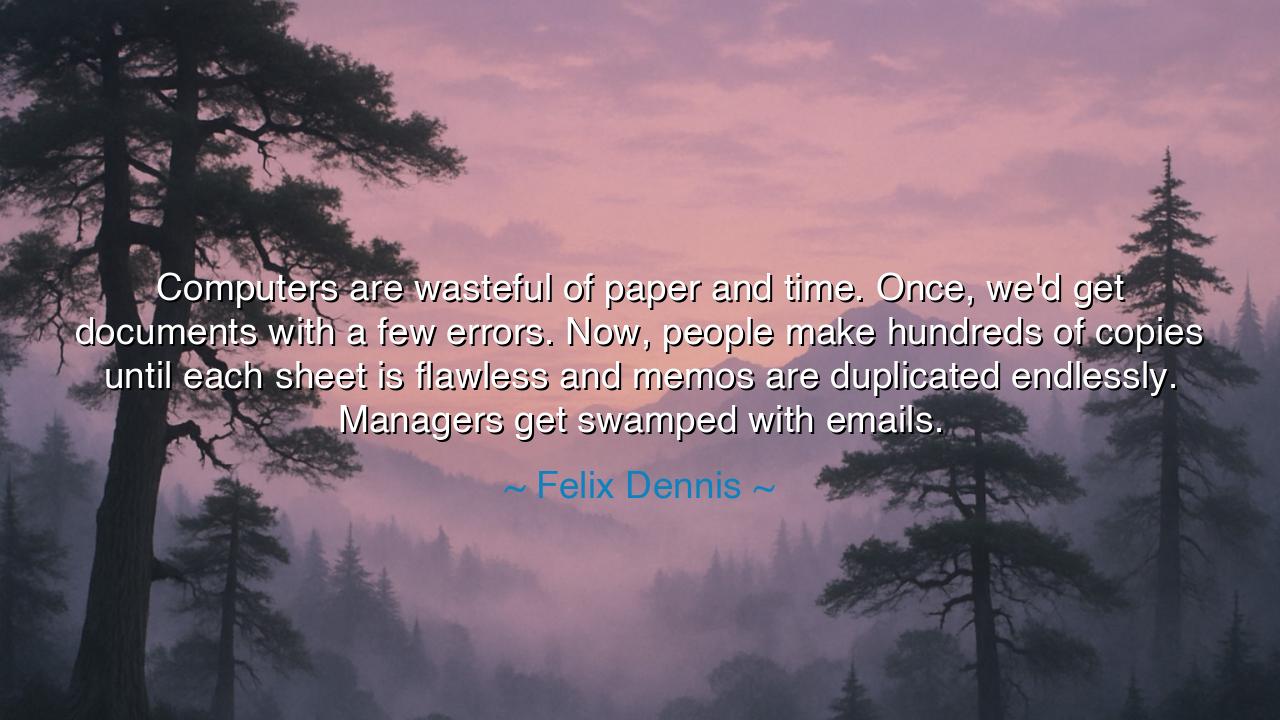
Computers are wasteful of paper and time. Once, we'd get
Computers are wasteful of paper and time. Once, we'd get documents with a few errors. Now, people make hundreds of copies until each sheet is flawless and memos are duplicated endlessly. Managers get swamped with emails.






In the days of old, when the written word was crafted by hand, each stroke of the quill was deliberate. Errors were rare, for each letter bore the weight of the writer’s focus and intention. But as the world advanced, so too did our tools—first with the typewriter, then with the great computers that promised to ease our burdens. Yet, what was intended to be a tool for efficiency has, in many ways, become an instrument of endless consumption. The wisdom of Felix Dennis rings true: "Computers are wasteful of paper and time." For in this age of digital marvels, we have traded the simplicity of the past for a deluge of unnecessary copies, wasting both time and the precious resource of paper, as if the act of replication itself is the only measure of productivity.
It was once that a memo, a single sheet of parchment or paper, would suffice to convey a message, but now, in our obsession with perfection, the cycle of duplication is endless. Each document is copied, revised, then copied again. The digital realm, though freeing us from the tyranny of the quill, has shackled us with its own inefficiency. Managers, once revered for their judicious decision-making, are now buried beneath an avalanche of emails, each more trivial than the last, all requiring attention that could have been better spent on the true purpose of their role. The bureaucratic machine feeds on this cycle, demanding more, never satisfied, until the individual is consumed by the very systems they sought to control.
The telephone, once the great communicator of the modern world, has been replaced by the omnipresent email, the message arriving not in a single wave, but in a torrent. And yet, despite the speed at which it travels, it becomes more cumbersome and overwhelming with every click. What was once a tool to streamline communication has now become an anchor, dragging us deeper into the mire of superficial tasks that fill our day but lead nowhere. Consider the great empires of history, who managed with far fewer means yet achieved greatness. Alexander, for instance, did not spend his time waiting for endless reports. He understood that the true strength of leadership lay in decisive action, not in being overwhelmed by the constant noise.
In the echoes of time, there are those who sought simplicity over complexity. Diogenes, the cynic, lived with only the essentials, teaching that it is not the accumulation of things that enriches our lives, but rather the shedding of unnecessary clutter. The same lesson applies today: our obsession with perfection and endless revision clouds the true purpose of our work. Instead of moving forward, we are mired in the repetition of tasks that bear little fruit, creating mountains of digital documents that ultimately amount to nothing.
The lesson here, then, is not just about the dangers of technology, but about the mindset it cultivates. Efficiency is not measured by how many copies of a document we can produce or how many emails we can respond to in an hour. True progress lies in the ability to discern what is essential, to sift through the noise and focus on the actions that move us toward our goals. In this, there is a profound truth: the more we chase after the illusion of perfection—whether in our work or our communications—the further we drift from the true essence of our purpose.
Practical actions arise from this clarity: learn to say no to the unnecessary. Do not allow technology to dictate the rhythms of your life; instead, use it to amplify your focus and power. Streamline your communication, and limit the number of unnecessary emails and meetings that sap your energy. Cultivate a disciplined approach to your work, one where each document, each email, serves a clear and deliberate purpose. Only then will you escape the endless cycle of waste and return to the true power of productivity, where time and paper are used wisely, not recklessly. The lesson is clear: in an age of endless information, the greatest wisdom lies in simplicity.






AAdministratorAdministrator
Welcome, honored guests. Please leave a comment, we will respond soon